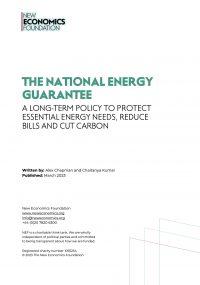Publications The National Energy Guarantee A long-term policy to protect essential energy needs, reduce bills and cut carbon By Alex Chapman, Chaitanya Kumar 10 April 2023 Download the report The Russian invasion of Ukraine and the UK government’s failure to reduce domestic reliance on gas have combined to exert exceptional pressure on household finances. While wholesale energy prices have begun to soften, the early withdrawal of government support means
Topics:
New Economics Foundation considers the following as important:
This could be interesting, too:
Robert Vienneau writes Austrian Capital Theory And Triple-Switching In The Corn-Tractor Model
Mike Norman writes The Accursed Tariffs — NeilW
Mike Norman writes IRS has agreed to share migrants’ tax information with ICE
Mike Norman writes Trump’s “Liberation Day”: Another PR Gag, or Global Reorientation Turning Point? — Simplicius
The National Energy Guarantee
A long-term policy to protect essential energy needs, reduce bills and cut carbon
10 April 2023
The Russian invasion of Ukraine and the UK government’s failure to reduce domestic reliance on gas have combined to exert exceptional pressure on household finances. While wholesale energy prices have begun to soften, the early withdrawal of government support means households continue to battle extraordinary budgetary pressure. Meting out the pain is our current energy market and billing system, which fails to protect communities’ essential needs, leaving many households with an impossible choice between heating or eating, and over 40% unable to afford a decent standard of living.
Current government support for energy bills fails households on four important tests: (i) putting protections around minimum essential energy needs, (ii) providing stability and confidence in future bills, (iii) driving equitable outcomes between social groups, and (iv) speeding up progress against our climate goals. By April 2024, even the existing inadequate support will be gone, yet NEF analysis suggests that bills could still be as much as 70% (£900) above pre-crisis (2021) levels, potentially leaving some of the lowest-income households spending up to 25% (£2,100) of their disposable income (after housing costs) on energy.
Given the failures of the current energy billing system, a new approach is needed. Our review of the proposed options suggests that a system which protects essential energy needs at a free, or low cost, while applying a premium to higher levels of usage (sometimes termed a ‘rising block tariff’ or RBT) has a range of advantages. Notably, under our proposed version of an RBT, all households can benefit from a safety net placed under their essential energy needs. Meanwhile, the premium price band, which is primarily paid by wealthier households, acts as an incentive for domestic investment in energy efficiency and renewables.
In this paper, we explore the potential of our proposal, a ‘national energy guarantee’ to deliver on household needs and meet our four policy objectives (i – iv). We present our system in two illustrative forms, one involving three price tiers, and one involving two. These tiers are designed to ensure that a minimum allocation of energy, estimated to be around the level required to power the essentials, is priced at 50% below pre-crisis levels. We show how the price of this essential energy band can be protected, even at the current, exceptional market price levels.
To ensure that our proposed premium price tier does not deliver negative outcomes for high-energy-using, low-income households, we show how our proposals might be married with an easily implementable set of allowances and an inexpensive social tariff. Our resulting package can deliver highly progressive and extremely well-targeted outcomes. Indeed, under normal (pre-crisis) conditions, 80% of households are winners from our proposal, with by far the largest gains – £250 on average – seen among the poorest 30% of the population.
With energy prices considerably higher than in 2021, it is too soon to withdraw government support to households. Today, and heading into 2024, further direct support with bills is needed. Our proposed system provides a more efficient and effective system for getting government help where it is needed. By freezing the cost of our lower tariffs – tariffs which are pegged specifically to essential energy needs – and only allowing prices to rise in the premium band, we can deliver not only fairly distributed support, but also an added incentive for decarbonisation efforts. At a cost similar to the revenue expected from the government’s recent windfall taxes on energy producers (£8bn – £10bn), a system is possible that delivers bill reductions for 94% – 98% of households, and even brings bills for over 70% of the lowest-income households down below their pre-crisis (2021) level, despite the prevailing wholesale costs.
A key feature of our national energy guarantee is not only its protections and support for those on low incomes but also its potentially game-changing impact on national decarbonisation progress. Incentivising richer households to accelerate investment in home energy efficiency and renewables is an urgent priority. Both of our proposed schemes deliver reductions of 20 – 30% on the average payback time on such investments under pre-crisis (2021) conditions and, for households consuming energy from the premium band, far greater incentives during periods of elevated prices. To cement this progress, and offer support to households in difficulty, we propose a system in which a household’s impending entrance into the premium tariff band acts as a trigger for action from an energy supplier, and the dispatch of a retrofit coordinator capable of advising a household on the potential options for reducing their bill.
Reform is urgently required to the UK’s energy billing system, as well as sustained financial support to households facing fuel poverty. A national energy guarantee provides a rare opportunity to meet this need in a cost-efficient way, simultaneously putting a safety net under all households, fairly distributing support to the least well-off, and driving progress on decarbonisation.
Photo: iStock
Campaigns Universal basic services National Energy Guarantee




